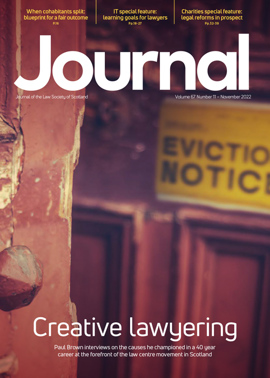Viewpoints
Eviction deterrent?
Last month, the Scottish Parliament passed the Cost of Living (Tenant Protection) (Scotland) Bill (it has since received Royal Assent). Among its measures to protect tenants during the current cost of living crisis are a reform of the law on damages for unlawful eviction.
Under s 37 of the Housing (Scotland) Act 1988, damages were calculated as the difference between the landlord’s interest in the property with and without a sitting tenant. This outdated valuation method carried several problems. It often resulted in a nil valuation. Tenants had to pay for a valuation report – a burden which presented its own barrier to justice, especially to those ineligible for legal aid.
Legal Services Agency proposed a simplified measure of statutory damages for unlawful evictions: a multiple of the monthly rent. At a minimum of six months and a maximum of 36, this would remove the main problems associated with the current approach to valuation, allowing more victims of the crime of unlawful eviction to receive justice. We recommended this change in a 2020 report.
The new Act reflects LSA’s proposals. However, we argue that it does not go far enough. The minimum threshold for damages is three times the monthly rent which, in our opinion, is too low. In addition, awards can be reduced further if the court or First-tier Tribunal “considers it appropriate to do so having regard to all the circumstances of the case”. There is effectively no minimum award.
Unlawful evictions ruin tenants’ lives. LSA continues to act on behalf of victims of unlawful eviction, and we support a further reform of the law to better reflect the impact on victims and deter unlawful eviction in the first place. The law is due to expire in April 2023. We look forward to engaging with the Scottish Government to ensure that it is strengthened.
Ben Christman, solicitor, Legal Services Agency, Glasgow
Hacking the Land Register?
Having brought up five children, I would never deposit my favourite biscuits in the family tin. Those succulent personal crumbs are safer and best hidden in plain, but obscured sight.
The cloud, for a hacker, is the biscuit tin. It has been reported that one of Scotland's most profitable digital enterprises in the gaming world has been hacked. We must assume, then, no one is safe.
And so I look at our security as a firm, but also the security of the Land Register of Scotland. As we know, land law is at the top of the pyramid of laws. I can log into ScotLIS with a simple unchanging password, yet trying to submit a LBTT return is like breaking into Fort Knox. But an easy knox to overcome if you have hacked my email. Are we sure that this paradigm underpinning the whole of our financial system, is beyond encroach? I think no.
Can I suggest that each legitimate practitioner is issued with a keycard and a keypad to enter any Land Register system, similar to our now banking system, and not sent emailed codes that can be hacked. Hopefully then the biscuits, or the coveted succulent "bits", would be significantly safer.
Can I also suggest (again) that Land Register forms have an extra page to enter additional LBTT data, so that we do not have to input the same data twice, more so given that Registers collect the LBTT payments.
IMHO the threat exposed by this letter is real.
Ed Wright, Black & McCorry, Livingston
Regulars
Perspectives
Features
Briefings
- Civil court: Broad sweep of the sheriff court
- Employment: Support through the cost of living crisis
- Family: Case management rules made for 2023
- Human rights: Protest as a defence to vandalism?
- Pensions: TPR issues auto-enrolment warning
- Property: New lease of life for commercial lets
- In-house: Advisers or leaders?






